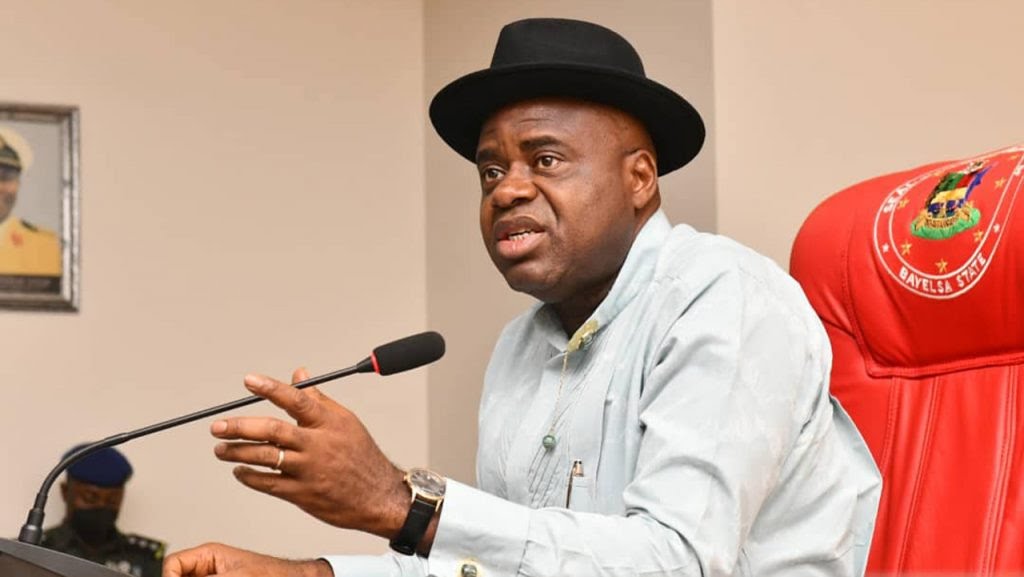News
Oil companies responsible for environmental degradation in Bayelsa – Diri

Gov. Douye Diri of Bayelsa says International Oil Companies (lOCs), particularly Shell Petroleum Development Company, have been responsible for the environmental degradation in the state.
Diri disclosed this at the Annual Convention and Fund Raising of the Ijaw National Congress (INC) of the Americas, held in Houston, Texas, U.S., on Sunday.
It was reported that the congress has the theme: “Ijaw-Nation: Nurturing Partnership through Symbiotic Relationships Towards Homeland, Social, and Economic Development”.
The governor specifically fingered Shell as a major culprit in the degradation of the Bayelsa environment.
“After waiting for several years for dialogue without Shell or any other IOC coming forward, we will be compelled to institute legal action against the Dutch super oil major and other IOCs.
“Today, Shell is divesting and I call on the Minister of Petroleum (Oil) that we have a duty to ensure that Shell’s divestment must take care of ameliorating our environment.
“Today, our flora and fauna are gone. Our beautiful environment is also gone.
“We will need the support of our brothers and sisters in the diaspora because there is so much we will achieve if we work together,” Diri said.
In his remarks, Mr Heineken Lokpobiri, the Minister of State for Petroleum Resources (Oil), sought the support of ljaw people in joining hands with President Bola Tinubu on the advocacy against oil theft and environmental pollution.
Lokpobiri said: “If you go to our area in Bayelsa State, it is likely to be the most polluted state but people may not know.
“What is responsible for this pollution, it could be mainly people or companies. The people in that state are involved in getting illegal crude oil for illegal refining.
“After the refining they throw the rest into the river.
“You will agree with me that by the law, Federal Government owns the water and land resources. So, it behoves everyone to join hands together to fight this menace,” he said.
The Minister urged Nigerians in diaspora to support the efforts of the government, so that the environment can be preserved.
He appealed to ljaw people in diaspora to tell Nigerians in Niger Delta region to stop pipeline vandalisation.
“It will cause more harm to the communities than the little money they will make.
“No matter the proceed gotten from the illegal refining, it can not feed the people of the communities, so we appeal to those perpetuating such acts to desist.
“President Tinubu will continue to support all Nigerians in diaspora, including the ljaw people, because we occupy strategic position in the country and oil still remains the main strength of our economy.
“It accounts for at least 90 per cent of forex. We occupy the entire areas of coastline.
“For us to benefit from this resource, we need to work with government at all levels,” he added.
Earlier, the President General of INC, Prof. Benjamin Okaba, said the choice of the theme of this year’s event is very apt and captivating.
According to Okaba, the theme seeks to identify and address the divergent means, methodologies and strategies of rejigging, mobilisng, galvanising, repositioning credible and symbiotic linkages as well as partnership among the Ijaws in the Americas and others in diaspora.
“Despite the God-given enormous human and natural resources of the Ijaws, who are equally ranked among the four largest ethnic groups in Nigeria, the Ijaw nation, the focus of this conversation, is badly impoverished, brutally balkanised, neglected, and undermined by successive administrations in Nigeria, even before independence.
“The Ijaw local economy is badly articulated. This is worsened by the lack of meaningful wealth creation/empowerment and employment opportunities.
“The Ijaw ecosystem, to say the least, the worst ever anywhere in the world, has continuously faced unmitigated catastrophes arising largely from oil and gas exploitation-related pollution without any reasonable form of remediation and compensation.
“The Ijaws suffer a slave and stranger status in a nation where they are aboriginal and the producers of its economic mainstay,’’ he said.




 Davido's Net Worth & Lifestyle
Davido's Net Worth & Lifestyle 
